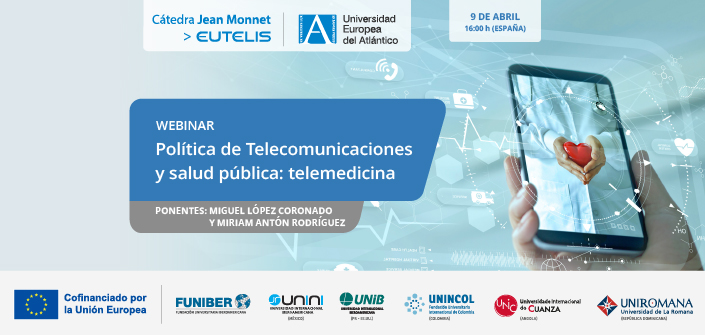On April 9th at 4:00 p.m. (Spain), the Universidad Europea del Atlántico (European University of the Atlantic, UNEATLANTICO) will organize a webinar entitled: “Telecommunications and Public Health Policy: Telemedicine.”
The session will be taught by Miguel López Coronado and Miriam Antón Rodríguez and is integrated in the Jean Monnet Chair “Telecommunications Policy in the EU and the Information Society” offered by UNEATLANTICO.
Telecommunications applied to medicine allow patients to receive treatment in health services. The different applications developed with this aim allow not only health care but also provide solutions to sanitary management in every aspect, from telephone appointments to clinical sessions, becoming telemedicine.
The event is held in collaboration with the Iberoamerican University Foundation (FUNIBER), the Universidad Internacional Iberoamericana de Puerto Rico (International Iberoamerican University of Puerto Rico, UNIB), the Universidad Internacional Iberoamericana de México (International Iberoamerican University of Mexico, UNINI Mexico), the Fundación Universitaria Internacional de Colombia (International University Foundation of Colombia, UNINCOL), the Universidade Internacional do Cuanza (International University of Cuanza, UNIC), and the Universidad de La Romana (University of La Romana, UNIROMANA).
The conference is free of charge and open to anyone interested in the topic. It will be broadcast live in each country where FUNIBER is present. Broadcast schedules are available at this link. Registration is required to participate:
Registration for the webinar: “Telecommunications and Public Health Policy: Telemedicine”
If you are interested in receiving the complete training of the chair, you can find more information at this link. Students in the program must complete practical sessions focused on gamification and mobile application design to receive their accreditation.
The objectives of the Jean Monnet Chairs, which are specialized teaching positions in European Union studies for university professors and associate professors, are to improve the teaching of EU studies through specialized programs; to conduct, monitor, and supervise research on EU-related topics at all levels of education; to train and advise the next generation of teachers and researchers; and to provide qualified guidance to future professionals in European affairs.
“Funded by the European Union. However, the opinions expressed are the sole responsibility of the author(s) and do not necessarily reflect the views of the European Union or the European Education and Culture Executive Agency (EACEA). Neither the European Union nor the granting authority can be held responsible for them.”


